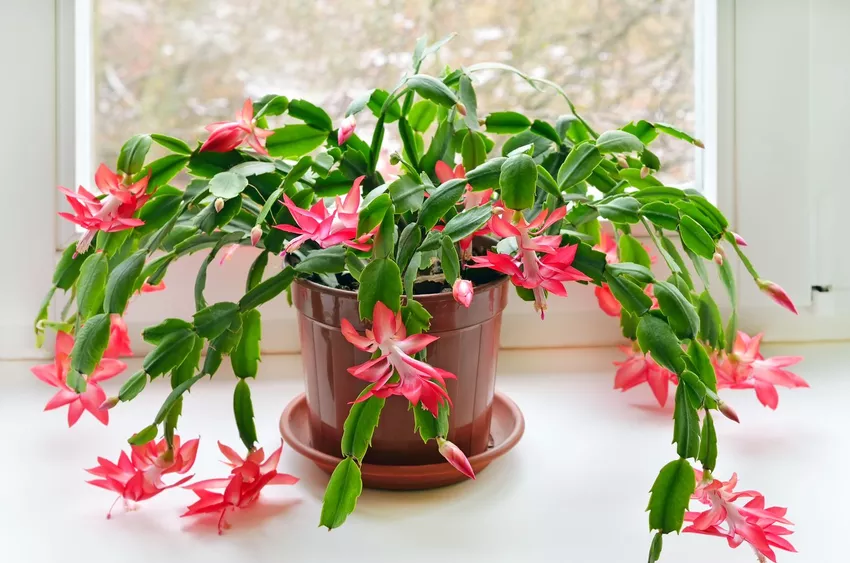Before you put the Christmas cactus in your home, you naturally want to know whether it is a poisonous plant. Especially when animals or children could be affected.

The Christmas cactus (Schlumbergera x buckleyi) is a real cactus plant (Cactaceae) - even if it doesn't really look like it. The wild species of the hybrids bred by us come from the tropical and subtropical areas of Brazil. The green shoots composed of many segments are platyclades. These are changes in the shoot axis that the Christmas cactus uses to store water and carry out photosynthesis. If these leaf-like structures are injured, a plant sap escapes. This is - like all other plant parts of the Christmas cactus - only slightly poisonous.
Is the Christmas cactus poisonous to children and adults?
The Christmas cactus, which is considered to be slightly poisonous, does not usually pose a threat to adults. However, no parts of the plant should be eaten. The plant sap that escapes when the leaf-like shoot segments are injured can possibly lead to skin irritation. It should therefore not come into contact with the skin or mucous membranes. Wearing gloves is a good idea, especially when caring for the Christmas cactus and when you want to repot, cut and propagate the Christmas cactus. It is also advisable to discourage children from eating the Christmas cactus. If significant amounts of Christmas cactus have been eaten by a child, seek medical attention immediately, particularly if an upset stomach develops.

People with a latex allergy should exercise particular caution. The plant sap that escapes when the segments are injured contains proteins. In the case of the Christmas cactus, these are very similar in structure to the latex proteins. This can lead to a so-called cross-reaction: This means that people who are allergic to latex may also have an allergic reaction to the Christmas cactus. The allergens get inairborne via the dust on the leaf surface, can get into the airways and cause allergic reactions.

Is the Christmas cactus poisonous to cats and dogs?
Although slightly poisonous, the Christmas cactus can pose a threat to cats. Since cats are quite curious pets, it can quickly happen that they nibble on the Christmas cactus. If a hungry cat has eaten the ornamental Christmas cactus, symptoms of poisoning such as diarrhea and vomiting can occur. Observe the animal first, the symptoms should disappear after a few hours. If there is no improvement, a veterinarian should be consulted.

Although dogs don't like to nibble on plants as much as cats, there are times when a dog will eat parts of the Christmas cactus. Dogs can also show slight symptoms of poisoning such as lethargy, vomiting and diarrhea or even allergic reactions. In this case, too, the animal should first be observed and, if necessary, a veterinarian should be consulted if there is no improvement after several hours. Incidentally, these reactions are not all due to the slightly toxic plant sap, but also to the fact that dogs cannot digest the fiber in the plant fibers.
If you don't want to do without the blooming Christmas cactus with a child or pet, there is a compromise that solves the problem: The cactus plant can simply be planted in a hanging basket and will also feel at home in the dizzy heights - completely out of reach of child and animal. Then just make sure to quickly collect and dispose of fallen plant parts. The flowers of the Christmas cactus are not poisonous, so don't worry if they fall to the ground.

At a glance: how poisonous is the Christmas cactus?
- Christmas cactus is slightly poisonous
- The sap is slightly poisonous
- May cause cross-reactions in people allergic to latex
- Children may experience vomiting and diarrhea if eaten
- Eating pets also causes symptoms of poisoning
- Symptoms include diarrhea, vomiting and sluggishness
- hanging basket asinaccessible place for children and pets possible
- It is best to collect fallen plant parts right away
Don't want your Christmas cactus to lose leaves that can become too interesting for your kids or pets? With proper care of the Christmas cactus, this does not happen. We'll show you how.